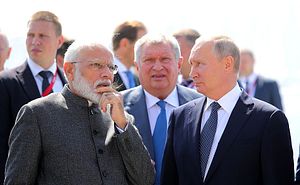In the context of the recent India-Russia annual summit in Vladivostok, there were some underlying interests between the two countries that seemed conspicuous. Firstly, India and Russia find themselves with very few political issues between them, a rare foreign policy relationship that has stood the test of time. Recently, India’s External Affairs Minister S. Jaishankar pointed to the fact that the India-Russia relationship has remained a relatively stable factor in international relations, more so than any other significant relationship since the heydays of the Cold War.
Secondly, both countries are building on the economic dimension of their partnership, evidenced by Prime Minister Narendra Modi’s participation as the chief guest in the Eastern Economic Forum to boost Indian investments and business in Russia’s Far East. There is an increasing recognition that the economic relationship can move beyond its current one-dimensional nature based on New Delhi’s reliance on defense imports from Moscow.
Thirdly, and most importantly, India and Russia have a common interest in reducing their dependence on the United States and China in matters of regional importance. While India is tugged by the United States to deepen their military partnership through various initiatives like the Quad, Russia’s current strategic closeness with China is not guaranteed in the long run.
Greater Indo-Russian cooperation should seem like a foregone conclusion. New Delhi and Moscow could benefit greatly from strategic alignment given the current geopolitical rivalry unfolding in the Asian theater between Beijing and Washington. While China has little reason to draw down its military presence in the Indo-Pacific, the United States continues to attempt to bring together like-minded countries to check China’s moves.
India, being an important stakeholder in the region, has obvious interests in seeing China pushed into a disadvantageous position. However, it has still not bought into the U.S. idea of containment, which retains features of the Cold War pushback against the former Soviet Union. Moreover, India has carefully broached the issue by avoiding overt anti-China posturing in the region. It has also shown no desire to toe the U.S line, which it deems as harming its “strategic autonomy.” Thus, for India, the Indo-Pacific strategy comprises largely of either cooperative or coercive engagement.
As far as Russia is concerned, the growing need to revive its Eurasian stakes has complicated the notion of strategic convergence with China whose Belt and Road Initiative (BRI) overlaps in the former’s traditional sphere of influence. Even in the context of the Indo-Pacific, Russia is playing its cards deftly as it re-examines its ties with various actors like ASEAN in the region. Given the current emphasis on building capacity in its Far East, Russia has its own vested interest in creating linkages between the Indian Ocean and the North Pacific Ocean.
As India expresses keen interest in shoring up its energy supplies from Russia’s Far East, the broader contour of the development is the two countries’ strategic convergence on the region’s issues. In the Indo-Pacific, India and Russia have carved out a unique strategy to amplify their own machinations. While New Delhi has sought to break free from the U.S.-China geopolitical rivalry in the region, Moscow has come up with a compelling strategy in the form of the Eastern Economic Forum to build strategic relationships with Asian countries to limit its reliance on China. Meanwhile, in Afghanistan, India might have reservations about the Taliban’s rise to prominence at the expense of the democratically elected government in Kabul but having Russia as a channel to influence the Taliban after a U.S. withdrawal could play to India’s favor.
On the China front, India is seeking to diversify its options beyond the U.S.-led initiative and encourage a multi-stakeholder approach. This works in Russia’s interests, as it should know better than to put all its eggs in the Chinese basket. Despite their growing bonhomie, Russia is better off considering expanding its ties with other Asian countries like India, Vietnam, and Indonesia than solely piggybacking on China in matters relating to the Far East, Central Asia, and Asia as a whole.
Such scenarios broaden the scope for a “third” order centered on Indo-Russian lines. The U.S.-led order encapsulated in the Indo-Pacific (the Quad), Afghanistan (a pending troop withdrawal and Taliban peace deal) and China strategy (the trade war) has resulted in multiple disruptions in the wide Asian region. Further, the China-led order has sustained in its own disruptive ways from the Indo-Pacific (South China Sea dispute) to Afghanistan (strategic leverage over Pakistan) to its U.S. strategy (again, through the trade war).
The third order, unlike the American and Chinese versions, is neither inspired by antagonism toward any particular country nor achieved through the violation of international law or trade practices. Moreover, the third order is reflective of the geopolitical realities in the region, based on a multi-polar, rules-based, mutually beneficial framework. Given the enduring shadow of the Sino-U.S. rivalry, India, and Russia have their task cut out in framing this third narrative. However, the continuing relevance of such an order would be tested against the strategic necessity of the Indo-Russian cooperation. If the strengths of the partnership are carried forward in the times to come, it would not only elevate their bilateral ties to a new level, but offer a refreshingly fresh perspective on how issues in the region are addressed.
Carl Jaison is currently a research associate at the Centre for Air Power Studies (CAPS), New Delhi.

































